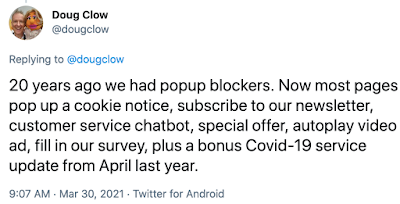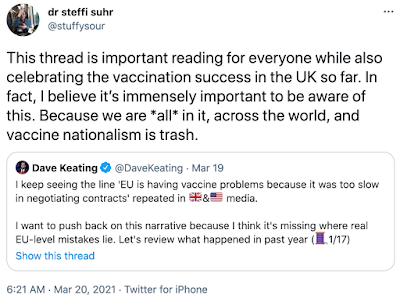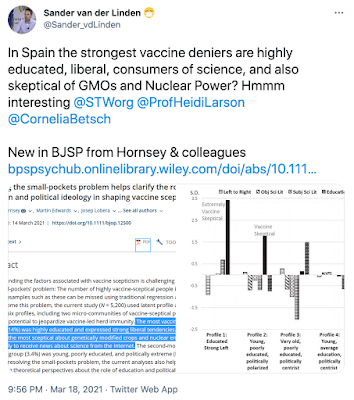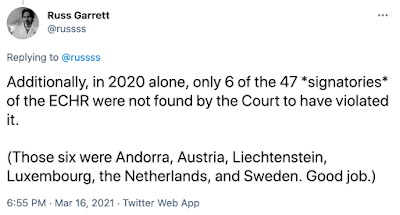Fortnightnotes: heating, levelling, generations
From a new report on UK experiences of food through the pandemic:
 |
| https://twitter.com/FoodEthicsNews/status/1372536574269923330 |
If you are in the UK, you can see how polluted it is at your address - http://addresspollution.org/
 |
| https://twitter.com/xr_cambridge/status/1372818902036664320 |
Chris Giles writes in the FT [paywall] about the UK's failure to make progress on reducing the carbon burn of home heating. The Green Homes grant has flopped "because it is highly restrictive, only allowing
energy-saving measures such as “secondary” improvements to windows and
doors if combined with “primary” measures often inappropriate for older
homes."Also - "there is a stealth tax on energy bills through the “environmental and social obligations” required from energy companies... these account for under 2 per cent of a typical gas bill, but nearly 23 per cent of electricity bills."
HT Chris Vallance -
 |
| https://twitter.com/radioproducer/status/1372826542590545924 |
Heat pumps are a good way to decarbonise home heating, but they do still generally seem to require a lot of rework for existing properties. Less efficient, but also less re-engineering of your home needed, if you can get an electric boiler! These ones use microwaves. Thanks to Clare Rowland.
 |
| https://twitter.com/DanielRThomas24/status/1375005248713068544 |
A rich directory of open technologies, communities, and more "to sustain a stable climate, energy supply, and vital natural resources" - https://opensustain.tech/ Thanks Roland Harwood for the link!
Here's a long list from Byline Times of occasions where Ministers have misled the House of Commons over 18 months.
 |
| from Liquid Modernity by |
A good outline from MySociety about the Police, Crime, Sentencing and Courts Bill, now in committee stages. Still time to write to your MP to make your views known, for instance about Clauses 54 to 60, amending the Public Order Act 1986, which would make most protest potentially seen as illegal.
There seems to be a sudden burst of petitions and projects seeking electoral reform, for example, Open Britain's PR2028. Figuring out how to make such changes real seems important too, as even with evidence from citizen assemblies etc, the government is unlikely to adopt alternatives. This might mean innovations such as primaries to enable the opposition vote to not be split between parties.
In the meantime let's hope for more accountability. It's good to see more legal challenges as a way to make change:
 |
| https://twitter.com/Foxglovelegal/status/1376460698524528641 |
Attending COP26 in Glasgow looks like it will be an expensive business - "Climate conference rip-off as COP26 delegates asked to pay £12,000 for windowless room" - and official accommodation managed in bulk by a Swiss firm. Ouch.
 |
| https://twitter.com/thomasforth/status/1369947534924320773 |
Grim new report from the British Academy (an institution I probably wouldn't be aware of, if Hetan Shah wasn't there now!).
In its new multi-disciplinary evidence review, The COVID decade: understanding the long-term societal impacts of COVID-19, the Academy forecasts that significant intervention will be needed to avoid an acceleration towards poorer health, social and economic outcomes and a more extreme pattern of inequality. Some interconnected trends highlighted include:
- Low and unstable levels of trust in the national government, undermining the ability to mobilise public behaviour;
- Widening geographic inequalities on measures such as health and wellbeing, local economic risk and resilience, and poverty;
- Worsening social development, relationships and mental health – impacts which will vary according to age, gender, race and ethnicity, and levels of social deprivation;
- Severe strains on the capacity to support local community infrastructure, which has risen in importance during the pandemic;
- Lost – and likely unrecoverable – access to education at all levels, exacerbating existing socio-economic inequality, limiting access to digital skills and technology and impeding progress towards a prosperous, high-skilled economy.
Where will the UK Levelling Up funds go? NPC looked into this -
At the March 2021 Budget, the Chancellor announced three new pots of levelling up funding: the Levelling Up Fund, the UK Community Renewal Fund, and the Community Ownership Fund.We have analysed these funds, worth £5.17bn, to understand what they can be spent on, and what opportunities there are for charities and civil society to play their part...
- The new funds announced at the Budget prioritise hard infrastructure such as transport, purchase and repair of buildings, and building new parks. Of the total £5.17bn, we estimate that up to £4.48bn, 87%, could go on capital investment over four years.
- Although there is some potential for social infrastructure, such as skills training, the new funding announced has limited scope for services such as youth provision, addiction, or homelessness, which many would think are important for levelling up our communities.
- There are 28% fewer local charities per 1,000 people in areas prioritised for the Levelling Up Fund (Priority One compared to Priority Three areas). This implies there will be fewer chances for charity partnerships in the areas prioritised.
 |
| https://twitter.com/sarahoconnor_/status/1374306115844939778 |
I enjoyed Ron Deibert and David Runciman on Reclaiming the Internet for Civil Society - CRASSH video. Ron's expertise around the real threats for civil society is useful perspective here.
Do you (still) think Google is a web search engine?
 |
| https://twitter.com/mikebutcher/status/1374631187629682690 |
Heather Burns (again) on generations in tech policy
we’ve gotten a lot of mileage out of the trope of the internet being threatened by elderly politicians who don’t understand it, or us. And that trope, for the most part, is as true as it ever was.
... We – the GenXers – think of the internet as the open web. The land of dialup telnet Unix systems, the days of table layout, the days of dot com, the days of early tech startups, the days of the internet as a connector, the days of the internet as a business opportunity, the days of the internet as a path to social justice and revolutions, the days of the internet as a light in the darkness. That’s all we have ever known.
Today’s policy facilitators – the millenials – think of the internet as MySpace and Facebook. The closed web. The land of always-on broadband and wifi, the days of content management systems, the days of tech bros, the days of the internet as a divider, the days of the internet as an acquisition for the giants, the days of the internet as a path to radicalisation and hatred, the days of the internet as petrol on a spark. That is all they have ever known.
And that is what they draft policy briefings, proposals, and legislation against.
 |
| https://twitter.com/WebDevLaw/status/1372667850234683399 |
The Techdirt piece by Mike Masnick is worth a read and draws on other thinking, illustrating how much more there is to the internet.
Rachel Coldicutt writes about how we can use the internet differently. A lot of Doteveryone references in there, and a reminder that even back in the early days there we were trying to recognise and name a wider concern than just "Facebook" or "Google"...
Let’s make a scene and rebel against Big Tech...
What do I mean by occupying technology? I mean, roughly, bending it to our will; taking advantage of its adaptivity to do something different.
... It turns out it’s really difficult to get people to rebel against something if they can’t see it, don’t feel empowered to make choices about, and don’t really understand it.
... And it’s not surprising, because what exactly are we rebelling against? Is it the unnecessary collection of data? The illusion that we have unlimited choice when — at least some of the time — we’re just doing what the algorithms tell us? Is it bad working conditions for gig workers, unjust algorithmic decisions, the environmental impact of emerging technologies, the erosion of democracy, or the appalling concentration of power and money by a few billionaires?
I mean, it’s all of those things, but you can’t really put that on a t-shirt or a protest sign.
And refusal isn’t really possible. Facebook still collects data about you even if you don’t have an account, and modern economies are so entangled with modern technologies that smashing the machines and walking away is only really an option if you’re independently wealthy or live alone on a desert island — and, let’s face it, they’re not the revolutionaries we need now.
We can adapt tech to be what we want it to be - messy, connected, human.
 |
| https://twitter.com/dougclow/status/1376808283542061062 |
W. Patrick McCray reviews two books on Silicon Valley's hidden voices and history. "When I drive past Hangar One, I no longer think of it as the place that
once sheltered giant dirigibles. I know it now as where the Google
executives park their private jets." So many echoes for me in this! Thanks to Diane Coyle for the link.
Travel the world from your web browser: https://travel-remotely.netlify.app/
Ooh -
 |
| https://twitter.com/j2bryson/status/1373024249095536646 |
Cory Doctorow has also written a thread about ad tech monopoly and fraud, and the media.
It's always good to see the Data Journalism Handbook thriving - there's a new edition out.
 |
| https://twitter.com/guyverhofstadt/status/1375843697741422600 |
The weirdest thing about vaccines is how we seem to be so pleased with the UK rollout, to the extent that it seems it might eclipse the dreadful mismanagement of earlier stages of the pandemic and other control methods. And yet I seem to know many young, healthy Americans who are vaccinated, when that's still months away here.
 |
| https://twitter.com/stuffysour/status/1373157694513807360 |
Vaccine sceptics may not be who you expect:
 |
| https://twitter.com/Sander_vdLinden/status/1372668140421840903 |
Long article about why we need greater use of software bill of materials, by Sybe Izaak Rispens.
RUSI on the need to tackle illicit finance in the UK.
An alternative framing of 'finance eating the world" from Drew Austin
As GameStop helped to clarify a couple of months ago, everything is simultaneously a game, an investment vehicle, and “content,” and domains that haven’t yet been pulled into this vortex soon will be.
I found quite a few gems in this Zebras Unite event, ostensibly on underrepresented startup founders. A powerful set of insights into venture capital (so young! and so driven by fear), how everything is being eaten by finance, the dystopia of $500 "resistance" cashmere sweaters, what matters in a new venture and how you can protect it.
 |
| https://twitter.com/russss/status/1371898028584493061 |
Thanks Mark Hurst for this:
• Finally, a limerick about NFTs, courtesy Limericking:
The NFT market has grown,
As eight-figure auctions have shown.
The overall price is
A worse climate crisis
For art you pretend that you own.